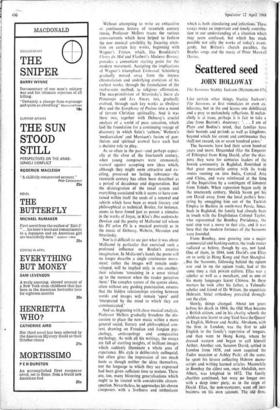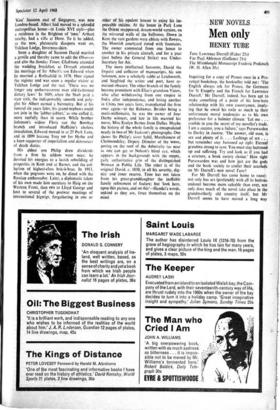Scattered seed ±i JOHN HOLLOW AY !
The Sassoons Stanley Jackson (Heinemann 63s)l Like certain other things, Stanley Jackson's•
The Sassoons at . first stimulates or even ex; hilarates, but in the end leaves one debilitated and a prey to melancholy reflections. If melan-
choly is at issue, perhaps it is fair to take a
clue from Burton's Anatomy: . . I am of Plato and Bodine's mind, that families have their bounds and periods as well as kingdoms, beyond which for extent and continuance they shall not exceed, six or seven hundred years.'
The Sassoons have had their seven hundred years and more. Descended (like the Emperor of Ethiopia) from King David, after the dias- pora they were for centuries leaders of the Jewish community in Baghdad, flourished ip that great mercantile centre with its tradq routes running on into India, Central Asia and China, and were reinforced at the timq of the Inquisition by a contingent of kinsmen from Toledo. When repression began early in the nineteenth •century, Sheikh Sason got his
son David away from the local pasha's bowl
string by smuggling him out of the Turkish Empire to Bushire in south-west Persia. Since, back in Baghdad, the family had already been in touch with the Englishman Colonel Taylor, who represented the Bombay Presidency, the
next step was a move to that city, and it was here that the modern fortunes of the Sassoons were founded:
From Bombay, now growing into a major commercial and banking centre, the trade routes radiated as before, though by sea, not land.
One of them, in 1844; took David's son Elias on to settle in Hong Kong and then Shanghai. .t But the Sassoons, following behind the opium war and in -on the opium• trade, had at the same time a rich private culture. Elias was a
, scholar as well as a merchant, and as one of his many languages learnt Chinese. In these matters he took after his father, a Talmudic scholar and friend of Dr Wilson, the expatriate Hebraist. Strict orthodoxy prevailed through- out the clan.
Slowly, things changed. About ten years before his death in 1864, the Old Man became a British citizen, and in his charity schools the children now learnt to sing 'God Save the Queen' in English, Hebrew and Arabic. Abraham, with the firm in London, was the first to add English to the family's repertoire of tongues. and then went to Hong Kong, where he dressed western and began to call himself Arthur. Another son, Sassoon David, settled in London from 1858, and soon acquired the Tudor mansion at Ashley Park; all the same, he spent his leisure collecting Hebrew manu- scripts and writing learned articles. Meanwhile in Bombay the eldest son, once Abdullah, now Albert, was knighted in 1872. The family charities continued, but were no longer one with a deep inner piety, as in the reign of David. Elias, the non-westerner, went off into business on his own account. The old firm,
'Kau' Sassoon east of Singapore, was now London-based. Albert had moved to a splendid metropolitan home—in Louis XVI style—plus a residence in the Brighton of 'HRH.' Arthur, nearby, had a villa at Hove. To it he added, as the new, plutocratic diaspora went on, Tukhan Lodge, Inverness-shire.
Soon a daughter of Sassoon David married a gentile and thereby came to edit the Observer and also the Sunday Times. Gladstone attended the wedding breakfast, as Disraeli attended the marriage of Sir Albert's son Edward when he married a Rothschild in 1878. HRH signed the register and was soon a regular visitor at Tulchan Lodge and the rest. 'There was no longer any embarrassment over old-fashioned dietary laws.' In 1889, .when the Shah paid a state visit, the indispensably smooth and poly- glot Sir Albert earned a baronetcy. But at his funeral six years later, his grand-nephews could not join in the 'jabber-jabber,' as one called it. more ruefully than in scorn. While brother Solomon's widow Flora ran the Bombay branch and introduced Haffkine's cholera inoculation, Edward moved in at 25 Park Lane, and in 1899 became Tory me for Hythe and a keen supporter of imperialism and denouncer of death duties.
His eldest son Philip drew dividends from a firm he seldom went near; he devoted his energies to a lavish rebuilding of properties in Kent and at Barnet, and the col- lection of highest-class bric-a-brac. In 1913. when the pogroms were on, he dined with the Russian ambassador. Later, a diplomatic talent of his own made him secretary to Haig on the Western Front, then PPS to Lloyd George and host to several of the postwar meetings of international bigwigs, forgathering in one or other of his opulent houses to enjoy his im- peccable cuisine. At the house in Park Lane the Orient reappeared, dream-world version, on the mirrored walls of the ballroom. Down in Kent the vast gardens were ablaze with flowers, the Moorish courtyard rioted with -fountains. The owner commuted from one house to another in his private aircraft, and for a year (just before the General Strike) was Under- Secretary for Air.
The more intellectual Sassoons, David the linguist and collector of manuscripts, his son Solomon, now a scholarly rabbi at Letchworth, and Siegfried the writer and poet, have re- mained obscure. The other branch of the family became prominent with Elias's grandson Victor, who after withdrawing from one empire in India after independence, and losing another in China two years later, transplanted the firm once again—to the Bahamas. Besides being a multi-millionaire, he was the owner of four Derby winners, and late in life married his nurse, Miss Evelyn Barnes from Dallas. Maybe the history of the whole family is encapsulated neatly in two of Mr Jackson's photographs. One shows Sir Philip's sister Sybil, Marchioness of Cholmondeley, Deputy Director of the WRNS, posing on the roof of the Admiralty (as near as one can get to Nelson's blind eye, which appears in the background) with the empty, gaily authoritative grin of the distinguished Woman in Public Life. The other is of the original David, c. 1850, in all his severity, dig- nity and inner reserve. Time has not taken from his great-granddaughter the ineffable family refinement of feature; but 'look here, upon this picture, and on this'—Hamlet's words, unkind as they are, force themselves on the mind.











































 Previous page
Previous page